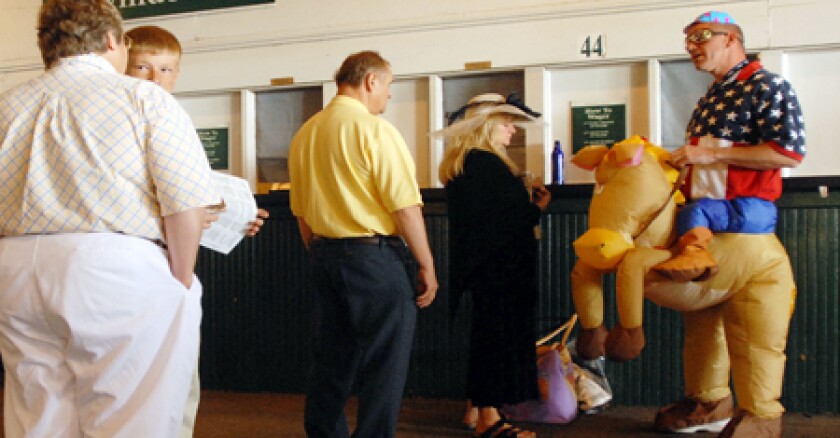That, in a nutshell, is New Jersey’s argument for allowing sports betting at the state’s casinos and four horse race tracks. Last week, a U.S. District Court Judge blocked a law passed by the state legislature, signed by Gov. Chris Christie and supported by a majority of voters in November 2011. The governor said he will take the case to the 3rd Circuit Court of Appeals in Philadelphia.
The case pits the state against the U.S. Department of Justice, the National Football League, National Hockey League, Major League Baseball, National Basketball Association and the National Collegiate Athletic Association. The plaintiffs argue that allowing sports betting in New Jersey would harm the integrity of sports, spur cynicism among fans and violate federal law.
As Governing's Ryan Holeywell noted last October, although the sports leagues warn of disaffected fans, "that doesn’t seem to have happened so far, despite an estimated $2.76 billion wagered on sports in Nevada in 2010, according to the American Gaming Association -- not to mention countless office pools on college hoops."
Part of what rankles legalization supporters is the fact that sports betting is already legal in four states: Delaware, Montana, Nevada and Oregon. Those states were grandfathered in when Congress passed the Professional and Amateur Sports Protection Act in 1992, which prohibited sports wagering in all other states. A provision in the law gave New Jersey a one-year window to legalize sports betting, but the state let that window close before taking action.
“There is no reason why Nevada can have sports gaming and we shouldn't,” Christie said in his response to his state’s loss in federal court last week.
Aside from the fairness issue, what’s at stake in legalizing sports betting? “Proponents of sports betting have said New Jersey is losing millions of dollars in potential revenue to offshore operations [and] organized crime,” reports The Newark Star-Ledger.
“Perhaps it is this dire financial portrait that has reframed the debate about legalizing new forms of gambling in New Jersey,” writes Tara Nurin of WNYC, an NPR affiliate in New York. “No longer do lawmakers bother to challenge them on the grounds of moral ambiguity, their addictive allure, or their potential threat to the financial well-being of families. Now the arguments begin and end with economics.”
The Newark Star-Ledger’s Steve Politi offers just that kind of economic rationale for why the state should leverage sports betting to raise new money. “Legalized sports betting has never made more sense than in the aftermath of Hurricane Sandy,” Politi writes. “Atlantic City was among the hardest hit areas, with a chunk of its iconic boardwalk washing away in the storm. Sports betting is not only a way to tap into new revenue for the rebuilding efforts -- it is expected to generate $150 million a year in taxes and fees -- but could also help fill casino hotels during the biggest sports weekends.”
But The Philadelphia Inquirer’s Patrick Kerkstra puts that potential revenue gain into context, arguing it isn’t all that much in the grand scheme of all things gambling and revenue related.
“Potential profits from sports betting are small compared with the industry's problems,” Kerkstra writes. “Atlantic City casinos are netting about $2 billion less in annual gaming revenue today than in 2006. Sports betting would generate only about $200 million, or a tenth of the gaming business Atlantic City has lost in the last five years to competitors and the lousy economy. Adjusting for inflation, casino gaming profits are at their lowest levels since the 1980s. On its own, legal wagering on Eagles games won't begin to reverse the trend.”
Two other reporters at The Philadelphia Inquirer, Suzette Parmley and George Anastasia, also emphasized the relatively small gains possible from sports betting, using Las Vegas and Nevada as reference points.
“Proceeds from sports wagering make up a small fraction of total gaming revenue in Las Vegas, representing only 1.2 percent of the $5.8 billion produced by the 42 casinos on the Strip in 2010,” Parmley and Anastasia write. “The ratio was similar statewide, with sports-betting revenue accounting for less than 2 percent of the total $10.4 billion wagered in Nevada.”
But even if the money isn’t all that much, is it fair to deny New Jersey that extra boost?
“London -- which has at least one betting parlor on every major street -- managed to hold an entire Olympics without any problems, while offering bets on everything from Usain Bolt winning the 100 to Michael Phelps getting seven golds,” writes Tim Dahlberg, a columnist for The Associated Press. “The NFL, meanwhile, hosts a game in London every year and hasn't complained yet about fans being able to bet their favorite on their way to the stadium.”
Realists in the pro-sports betting camp have tried to persuade the opposition with a different argument: It’s going to happen anyway, so it might as well be regulated by the state.
“The reality is that people want to bet on games and will do so whether it's legal or not,” Dahlberg writes.
Reporting by the Inquirer seems to back him up. “Bookmakers don't see Atlantic City as a threat,” Parmley and Anastasia write. “If anything, they say, legalized sports betting could bring them new customers. Most illegal bookmakers allow customers to gamble on credit, something legal sports-betting operations cannot do.”









